3 Rosie’s Daughters Celebrate Our Mother’s Life Story by Norma Horton Bryant
Post #16 – Rosie’s Daughters: The “First Woman To” Generation Tells Its Story by Matilda Butler and Kendra Bonnett
+++++++++++++++++++++++++++++++++++++++++++++
Following is the first of a series of stories of Rosie the Riveter’s
Legacy. We invite you to tell your story, or your mother’s.
Please email us and we’ll send you the details. We look forward
to honoring many of the women who worked during World War II.
+++++++++++++++++++++++++++++++++++++++++++++
Marian Perkins Horton
By Norma Horton Bryant
We knew we wanted to honor our parents. We had no idea how deeply we would be moved in the process.
As a child I once asked my mother, “Why do you have those tiny scars on your arms and legs?” She tilted her head back and a smile came across her face as if she was reliving her memories. She told me, “They are from a time when I was a welder during the war.” It was obvious she wore those scars as though they were her medals. She could not have been more proud of her part in the war effort.
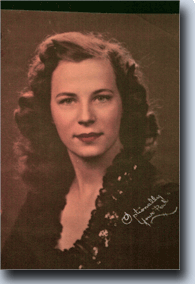 My mother, Marian Horton (Perkins at the time) was and still is, a beautiful woman with a strong sense of southern propriety, having grown up in Richmond, Virginia. I was intrigued as to what brought her into that world of work and made her enjoy the experience.
My mother, Marian Horton (Perkins at the time) was and still is, a beautiful woman with a strong sense of southern propriety, having grown up in Richmond, Virginia. I was intrigued as to what brought her into that world of work and made her enjoy the experience.
“I was just out of high school when I heard that Richmond Engineering was hiring women. They needed us to weld bomb racks, tank turrets and portable bridges.” I knew my mother loved adventure and the thought of serving her country this way must have been a perfect fit.
My sisters and I were always captivated by her stories. She told us a story of how the men already working on the lines had at first resented the women coming in and “doing men’s work.” They would try to intimidate the women by spitting chewing tobacco on their boots as they worked but my mother and a friend refused to be intimidated. Instead, they came up with a plan. They emptied tobacco pouches and filled them with shaved licorice. When they came to work for their next shift, the women each filled a cheek with “tobacco” as the men did. When the men spat on their boots, my mom and her friend spat licorice back on the men’s boots. Their spunk brought a laugh and cut the tension.
Another story we loved was about the time the “Truth or Consequences” radio show came to a Richmond theater to broadcast live for the GIs and local people. The premise of the show was to ask the contestants a riddle, and if they could not answer it they had to pay the consequences.
The producers wanted two women welders to be contestants so they came to Richmond Engineering and selected my mother and another woman for the show. They instructed the women to come to the theater after working all day, as they were, without cleaning up and still wearing their welding uniform, helmet and gloves. When they arrived, my mother and her co-worker were further “smudged up” and had their hair mussed before being sent onstage.
They were stumped by the riddle, “When is a door not a door?” Mom said they never would have thought to reply, “When it is ajar.” Mom and the other contestant had to pay the consequence, which was to be given a glamorous makeover and dressed in ball gowns, fur stoles and jewels. When they returned to the stage they received screams and cheers from the audience. To complete the Cinderella story, they were whisked off to a ball to dance the night away with two officers who were stationed nearby.
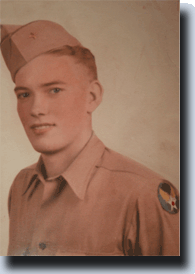 One more memory (and our favorite) was when my mother and friends, obviously dressed for a special occasion, were waiting for a bus. As they boarded, a couple of servicemen came up and asked them where they were going. My mother took notice of one handsome GI, but being a lady, would not tell him where they were going. The handsome GI, Eugene Horton, caught the next bus, asked where there was a dance that night and had the driver drop him off there. He found my mother and asked her to dance. They dated every time he had leave after that.
One more memory (and our favorite) was when my mother and friends, obviously dressed for a special occasion, were waiting for a bus. As they boarded, a couple of servicemen came up and asked them where they were going. My mother took notice of one handsome GI, but being a lady, would not tell him where they were going. The handsome GI, Eugene Horton, caught the next bus, asked where there was a dance that night and had the driver drop him off there. He found my mother and asked her to dance. They dated every time he had leave after that.
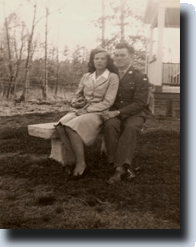 Several months later, the handsome GI received papers to report to South Carolina. Because they couldn’t stand to be separated, they were married. As Mom and Dad moved away from Richmond, Mom’s welding days ended. Obviously, her pride and fond memories did not.
Several months later, the handsome GI received papers to report to South Carolina. Because they couldn’t stand to be separated, they were married. As Mom and Dad moved away from Richmond, Mom’s welding days ended. Obviously, her pride and fond memories did not.
Mom always proudly told us that Dad had joined the Army the day he graduated from high school and that later he served in France.
Being very proud of both of our parents, my sisters, Janet Campbell and Lynn Dawes, and I found a way to honor them. We had no idea how deeply we would be moved in the process.
My sister Lynn has lived in England for about twenty years. In addition to teaching, she is a big bands singer. For many years she has performed at a WWII Memorial Weekend–an event Mom and Dad had enjoyed attending many years ago and often spoke of with great fondness.
The Severn Valley Railway “War Weekend” has been held every summer for the past fifteen years. The depots of the five towns along the line, connected by steam trains, are transformed to look as they did during the war. In addition to battle re-enactments, there are big band concerts with forties dance music. Re-creations of period residences and shops are set up. Re-enactors, musicians and the attending public dress in period attire that has special meaning to them. They engage in role-playing as a way of remembering those who served, supported and experienced WWII.
To celebrate our parents lives, Janet and I felt privileged to attend this event with our father this year. Sadly, because my mother has Alzheimer’s, she could not attend.
With several trips to Army surplus stores, we were able to recreate my dad’s uniform, which he wore proudly as he mingled and exchanged war stories with other veterans. My sister Lynn, dressed as a forties band singer when she performed, took pride in wearing the tailored suits my mother wore. My sister Janet and I dressed as Rosie the Riveter. We wore mock I.D. badges from Richmond Engineering using our mom’s name and a photo of her on our uniform as if we were our mother for the day.
There were people dressed to represent different branches of the military, including uniforms and costumes from Allied and Axis countries. The German Army officers gave our father a start. Even after so many years, he said the hair stood up on the back of his neck.
People came as Red Cross nurses, land girls, black market dealers and school aged children who were evacuated during the bombings. Attendees shared their stories of how the war influenced their lives and enjoyed listening to the memories of other people and their service on the ‘Home Front.’ Many of these people attend every year and were very welcoming to us as we were clearly there to participate.
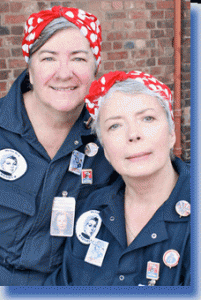 My sisters and I were able to share our mother’s story, as well as the spirit of the many Rosies of America with people attending this event who asked us about our Rosie attire and the photo of the “lovely lady” on the badges.
My sisters and I were able to share our mother’s story, as well as the spirit of the many Rosies of America with people attending this event who asked us about our Rosie attire and the photo of the “lovely lady” on the badges.
We had underestimated how much comfort it would give us to talk about her and her part in the war, especially since she can no longer do it for herself.
As the steam trains ran, there were flyovers by actual WWII planes. Using multiple speakers and special effects, air raids with realistic sounds of diving planes shooting at the station made our hearts race. Explosions were set off down the side train tracks to resemble bombs exploding. We found ourselves engulfed in the sights and sounds of 1942. This was at once awe inspiring and somewhat unsettling. We felt transported back into a time we had only heard described.
Listening to stories of bravery and sacrifice and soaking up the atmosphere of places that had been transformed gave us an even deeper sense of what it was like to be part of Mom and Dad’s wartime world.
We felt closer than ever to our parents, having taken a few steps in their shoes, if only by pretending.

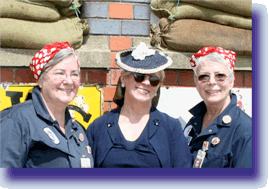



 Subscribe to our feed!
Subscribe to our feed!



{ 8 comments… read them below or add one }
Kick things off by filling out the form below ↓
Leave a Comment